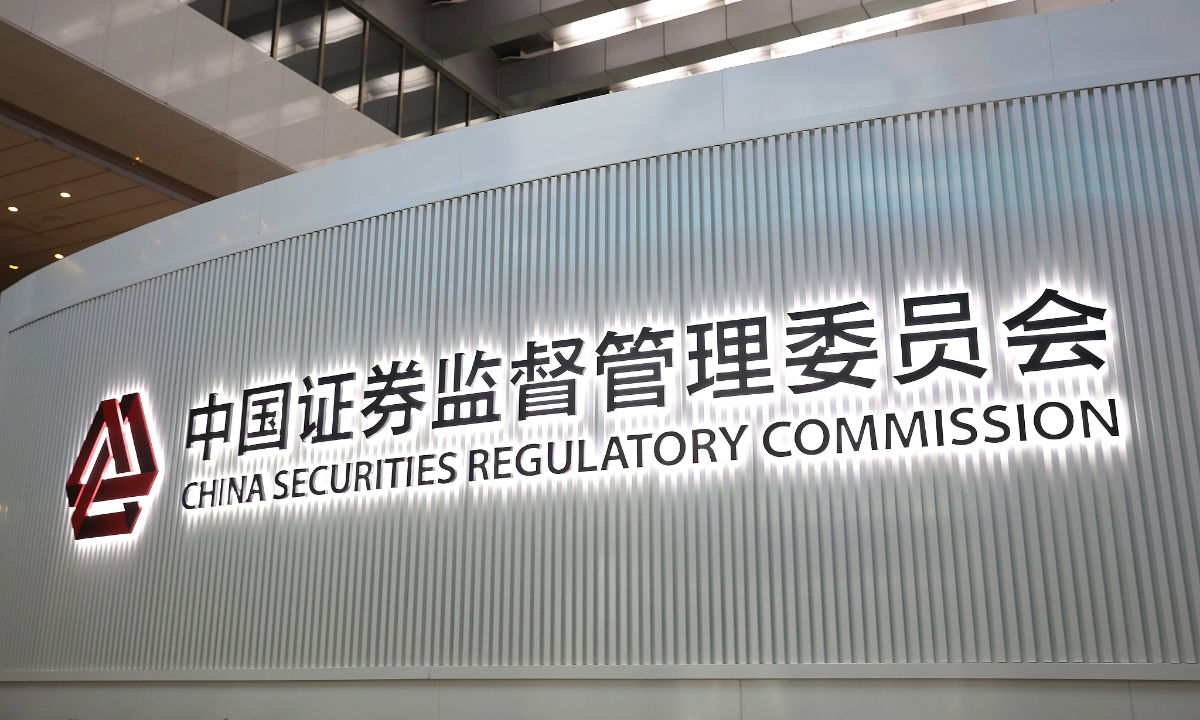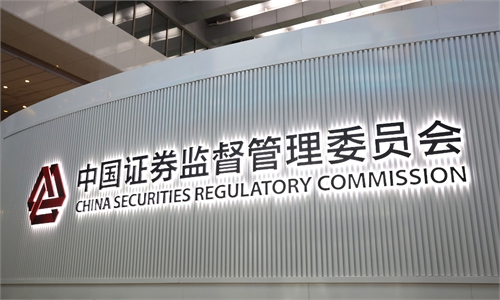Top securities regulator vows all-out effort to fully expand registration-based IPO system

China Securities Regulatory Commission (CSRC) in Beijing Photo:VCG
China's securities regulator on Thursday vowed an all-out effort to fully expand a registration-based IPO system in 2023, adding fuel to expectations of a more vibrant A-share market following draft rules unveiled Wednesday that intended to anchor the Chinese mainland equity market toward yet another major milestone in its 30 plus year history.The long-awaited expansion of the IPO reform across the full spectrum of mainland shares would increase investors' risk appetite while funneling capital into businesses in strategic emerging industries in a more efficient manner, market watchers said.
Reckoning the full expansion as a milestone to dovetail with an innovation-oriented development strategy and the national push for the markets to play a decisive role in the economy, they noted that the complete adoption of the registration-based IPO system would provide a tailwind for the Chinese economy to pull off indigenous and secured growth.
At an annual work conference on Thursday, the China Securities Regulatory Commission (CSRC) mapped out key priorities for 2023 and pledged to pull out all the stops to comprehensively implement reforms of the registration-based IPO system.
Under the registration-based IPO system, businesses seeking a listing on mainland bourses would be subject to a significantly streamlined and expedited review process, as compared with an approval-based IPO regime. Trading rules are also more flexible under the registration-based IPO framework that allows wider daily trading limits.
The CSRC officially kicked off the comprehensive IPO reform on Wednesday. The regulator was seeking public comment on draft rules on IPO registration management through February 16.
That suggests the securities regulator is ready to fire the starting pistol on a registration-based IPO system across the board, more than four years after an announcement to set up a sci-tech-heavy board in Shanghai, the first of its kind in the A-share market to adopt the registration-based IPO system.
The IPO reform expanded to the ChiNext market in Shenzhen in August 2020. And in mid-November 2021, the Beijing Stock Exchange began trading, simultaneously with the pilot of the IPO system.
With the trial IPO program having been in place for four years, all parties in the market have largely agreed upon the basic structure and principles of the IPO system. Accordingly, the capital markets have played a more notable role in serving the real economy, especially scientific and technological innovation, the CSRC said in a statement on Wednesday, concluding that the market is eligible for the full-spectrum expansion of the IPO system.
The main boards in Shanghai and Shenzhen that currently fall under an approval-based IPO system will join the forerunners such as the STAR Market in adopting the registration-based IPO system when the full expansion comes into force.
New shares on the main boards will still be subject to 10 percent daily trading limits, unchanged from the current rule, since the sixth trading day.
In a note sent to the Global Times on Thursday, a mid-sized brokerage in Beijing hailed the full-spectrum implementation of the registration-based IPO system as a major milestone development for the A-share market.
The IPO review system will become unified and standardized, as the main boards are set to replace the approval-based IPO system with the registration-based regime. In doing so, firms planning IPOs would be put on a truly equal footing, read the note.
Furthermore, as the IPO system becomes more open and transparent, the registration-based IPO philosophy that centers around information disclosure would turn out as prevalent. This means the securities regulator, bourses, brokerages, issuers and investors will see their positioning further crystallized while the markets would be in the driving seat, the mid-sized brokerage commented, stressing that the markets would root for genuinely premium businesses and give them better valuations.
The full expansion of the registration-based system is envisioned to increase market risk appetite, adding fuel to the springtime rally, according to Chen Mengjie, chief strategist with Yuekai Securities.
The full expansion would directly augur well for securities, financial and technology sectors. For one thing, lower listing requirements point to an increase in potential underwriting needs for investment banking businesses. An improvement in delisting rules, among other supporting measures, would prompt investment banks to act as watchdogs, thereby pushing for the capital market's sound and stable development in the longer run.
For another, high-growth sectors whose business visions align with the national strategic development will likely get more policy support, Chen continued, expecting the milestone reform to rev up the country's push for indigenous and secured development.
As of Wednesday, a total of 1,004 A-share firms fall under the registration-based IPO system, and 966 of them are categorized as strategic emerging industries ranging from new-generation information technology, high-end equipment manufacturing, biopharmacy, new energy and digital creative, per statistics from Yuekai Securities. The new-generation information technology sector bags the most firms, with more than 300.


